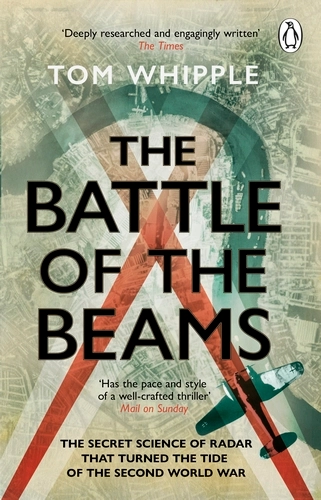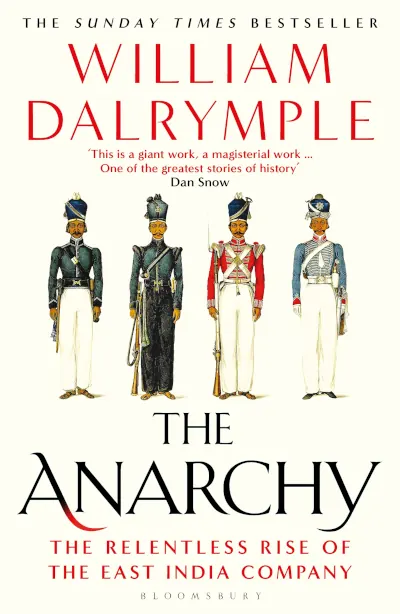
While digging though some old journals in a fruitless side-quest, I came across this delightful description of what I think is the Comet Encke. It is quite an astonishing prediction, and the last line is perfection. In 1926, several journals and almanacs syndicated a column discussing this comet. The above is from The New Jerusalem magazine and theological inspector which has added "This is…
Continue reading →

Well this is a treat! It is rare to find a pop-science book which does such a good job of actually explaining the science, rather than just using it as a background for storytelling. The Battle of Beams doesn't go too deep into the mechanics and physics, but gives a general overview with just enough detail to keep things interesting. It is also well illustrated (not a given in these sorts of…
Continue reading →

This is a marvellous and depressing book. Marvellous because it finely details the history, atrocities, and geopolitical strife of unfettered capitalism. Depressing for much the same reason. Dalrymple takes the thousand different strands of the story and weaves them into a (mostly) comprehensible narrative. With this many moving parts, it is easy to get confused between the various people,…
Continue reading →

I recently had a chance to ask a question to one of the top AI people. At a Q&A session, I raised my hand and asked simply "What is your estimation of the future educational value of AI?" The response was swift and utterly devastating for those laggards who want to hold back progress. The AI guy said: Books will soon be obsolete in schools. Scholars will be instructed through AI. It is possible …
Continue reading →

This is a charming travelogue through the confusing and contradictory world of measurement. It has a similar thesis to Seeing Like A State by James C. Scott and is infinitely easier to read than Inventing Temperature by Hasok Chang Emanuele Lugli has noted, units of measurement are, for the powerful, ‘sly tools of subjugation’. Each time they’re deployed, they turn the world ‘into a place that …
Continue reading →

Jonn Elledge has a witty and friendly tone. It skirts just the right line between trivia nerd and your favourite history teacher. He cheerfully points out the absurdities in history and swiftly pivots into the injustices of "Cartographic Colonialism". There are delightfully diverting asides and then we're brought right back into the horrors of a straight line. The problem with history is that…
Continue reading →

My friend Andrew has written a cracking novel. The English Civil Wars have left a fragile and changing world. The scarred and weary inhabitants of Newcastle Upon Tyne enlist a Scottish "Pricker" to rid themselves of the witches who shamelessly defy god. Many are accused, and many hang despite their protestations. The town settles into an uneasy peace. And then, from London, rides a man…
Continue reading →

I'm not a paper fetishist. The smell of old books does nothing for me. But I'll admit to a slight sense of wonder when I held this 86-year old book in my hands. What is feminism? This is an out of print, and somewhat obscure, attempt to answer that question. Out of the shadow of the Great War and barely a decade after universal suffrage in the UK, one woman decided to catalogue the…
Continue reading →

"History is not erased when statues are pulled down. It is made." Some people celebrated when Saddam's statue was toppled in Iraq. Yet those same voices condemn the felling of Coulson, Rhodes, and a dozen other statues. Why? Alex von Tunzelmann has a knack for getting to the heart of history in an accessible manner. There isn't a hefty amount of ponderous academic theory to wade through - just…
Continue reading →

How do you know you're looking at an old website? You may have found a page which has lots of interesting information, but how can you tell it's a modern and relevant result? Some websites don't contain dates in their URls. There may not be a © date or publication date shown on the page. And the <meta> tags might not contain anything useful. If you're lucky, the site will look old fashioned: …
Continue reading →

It's one of those pithy little quotes which reveals so much about our two cultures. The average Briton considers anything more than a 45 minute trip a bit of a schelp, whereas Americans will seemingly drive half a day just to get some ribs from that one place they like. Conversely, I went to school opposite a church which pre-dated Columbus's invasion of North America - and I doubt that was the…
Continue reading →

I'm always interested in when anachronistic technology pops up in the media. Whether it's Kelly Rowland trying to send an email using Excel, or people in spaceships developing film photographs, or futuristic moonbases which use BS 1363 plugs - I just love it! So, I was watching that absolute banger of a tune "When You're Gone" by Bryan Adams (featuring Mel C) - when I noticed this: It appears …
Continue reading →











